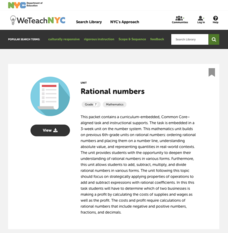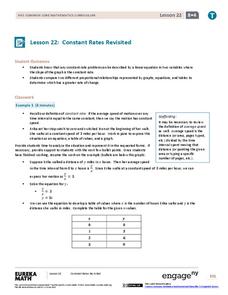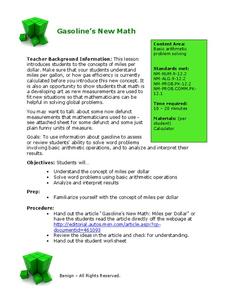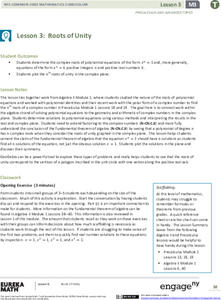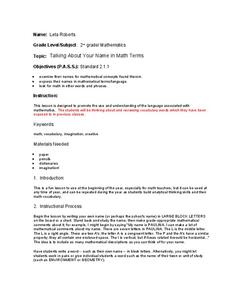EngageNY
An Appearance of Complex Numbers 1
Complex solutions are not always simple to find. In the fourth instructional activity of the unit, the class extends their understanding of complex numbers in order to solve and check the solutions to a rational equation presented in the...
EngageNY
Tangent Lines and the Tangent Function
Construct tangent lines and make the connection to tangent functions. An informative lesson reviews the geometry origins of the tangent function. Pupils use that information to determine how to construct a tangent to a circle from a...
Curated OER
Place Value Review: Tens and Ones Place
Young learners determine the place value of a digit in a given number. They review 10s and 1s place value by participating in activities using unit blocks. Some excellent independent practice is built in to this plan. A written...
New York City Department of Education
Rational Numbers
Order up a unit on rational numbers. A unit overview gives a basic outline of instruction and activities on rational numbers for the 7.NS domain. A performance task on profits at pizzerias assesses understanding of the concepts in the...
Alabama Learning Exchange
Place Value Review
Here is a fast-paced addition game which reinforces the concept of place values. Learners view a PowerPoint on place value, then engage in the game using a whole-class format. This is a stimulating, and interesting math game lesson.
EngageNY
Four Interesting Transformations of Functions (Part 4)
What do you get when you cross piecewise functions with transformations? An engaging lesson! The conclusion of a four-part series on the transformations of functions asks class members to apply transformations to piecewise functions...
Teach Engineering
Bone Mineral Density Math and Beer's Law
Hop into a resource on Beer's Law. A PowerPoint presentation introduces Beer's law as part of calculating bone density from X-ray images in the sixth lesson in the series of seven. Individuals work on practice problems with this law and...
EngageNY
Getting a Handle on New Transformations 2
Use 2x2 matrices to move along a line. The second day of a two-day lesson is the 28th installment in a 32-part unit. Pupils work together to create and solve systems of equations that will map a transformation to a given point. The...
EngageNY
Part of a Whole as a Percent
Pupils use visual models, numeric methods, and equations to solve percent problems. To complete the second installment of 20, they find the part given the percent and the whole, find the percent given the part and the whole, and find the...
EngageNY
Constant Rates Revisited
Find the faster rate. The resource tasks the class to compare proportional relationships represented in different ways. Pupils find the slope of the proportional relationships to determine the constant rates. They then analyze the rates...
Curated OER
Discovering New Units
Students use Cuisenaire rods to explore common denominators. In this fractions lesson plan, students build Cuisenaire representations of fractions, then find their equivalent counterparts to find the common denominator.
Charleston School District
Tables of Linear Functions
Don't forget the tables! The previous lessons in this five-part series examined the linear equation and graph relationship. The current lesson adds tables to the mix. At completion, individuals should be able to create a table of values,...
West Contra Costa Unified School District
Average Rate of Change
The concept of slope gets an approachable, yet theoretical, treatment in a comprehensive algebra lesson. The use of functional notation and problem-solving techniques keep the material rigorous, but detailed teaching notes and lots of...
Curated OER
Quilts and Math
Students create a pattern. In this patterns lesson, students review the meaning of symmetry and explore using pattern blocks. Students look for patterns in real quilts, photographs and pictures. Students work independently to plan a...
Beyond Benign
Got Gas
How much gas does it take to drive around town? The class uses a variety of mathematical procedures to take a look at the use of gas for transportation. Class members use a different unit to determine the cost of driving a car as opposed...
Mathematics Vision Project
Module 6: Trigonometric Functions
Create trigonometric functions from circles. The first lesson of the module begins by finding coordinates along a circular path created by a Ferris Wheel. As the lessons progress, pupils graph trigonometric functions and relate them to...
Discovery Education
By the Foot: The History of Measurement
When is a foot not a foot? When you use the length of your own foot to measure distances, of course. To underscore the importance of standardized units of measurement, middle schoolers engage in a series of activities that ask them to...
Alabama Learning Exchange
Radians: Just Another Way
Serve up angle measurements on paper plates. Pupils use paper plates and paper-folding techniques to create a unit circle with conversions for special angles. Using their plates, learners explore the relationship between angle...
Charleston School District
Pre-Test Unit 1: Exponents
How much do you know about exponents? The pre-test covers the concepts of integer exponents with both numerical and algebraic one-variable expressions. The test is also over representing numbers in scientific notation, operating with...
EngageNY
Roots of Unity
Visualize the nth roots of unity. Pupils calculate the nth roots of unity and find all n roots. Learners plot the solutions in the complex plane and observe that they are the vertices of a regular n-gon inscribed in the unit circle....
EngageNY
Horizontal and Vertical Asymptotes of Graphs of Rational Functions
Get close to your favorite line. Scholars use end behavior to help find horizontal asymptotes. With the understanding of domains of rational functions, learners find vertical asymptotes and then use graphing calculators to verify the...
New York City Department of Education
Peter’s Garden
Watch scholars' understanding of fractions bloom. The resource presents a performance task where the fractions are equal parts from the same whole, and mathematicians must use them to solve problems about a grade level garden. Teachers...
Curated OER
Talking about your name in math terms
Students talk about mathematical language. In this talking about your name instructional activity, students use the letters in their own name to review math vocabulary and concepts.
Mathematics Vision Project
Module 6: Congruence, Construction, and Proof
Trace the links between a variety of math concepts in this far-reaching unit. Ideas that seem very different on the outset (like the distance formula and rigid transformations) come together in very natural and logical ways. This unit...





